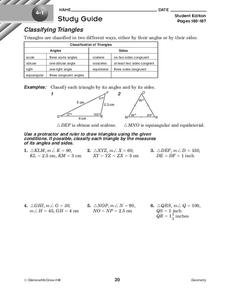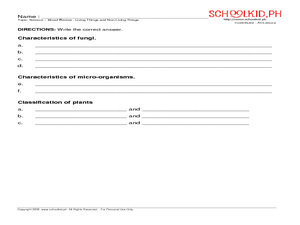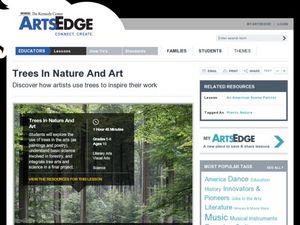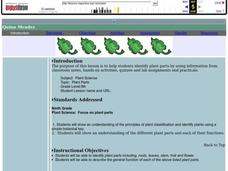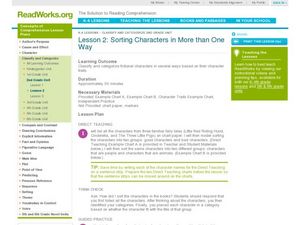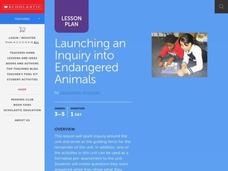Curated OER
Loggerhead Turtle
In this science worksheet, students color in the picture of the loggerhead turtle and read the fact sheet that focuses upon its classification.
Curated OER
Manatee
In this science worksheet, students color in the picture of the manatee and read the fact sheet that focuses upon its classification.
Curated OER
Classifying Triangles
In this classifying triangles instructional activity, 10th graders solve 6 different problems related to the classification of triangles either by their angles or by their sides. First, they use a protractor and a ruler to draw triangles...
Curated OER
Science - Mixed Review: Living Things and Non Living Things
In this living and non living things instructional activity, students fill in a mixed review that has them answering questions in the true and false, short answer, and classification formats. Students answer 59 questions.
Curated OER
Classifying Seashells
Third graders practice classifying seashells. In this seashell classification activity, 3rd graders listen to a guest speaker talk about collecting seashells. They participate in a discussion on the characteristics by which seashells are...
Curated OER
The Three Worm Phyla
Ninth graders examine the three worm phyla. In this classification instructional activity, 9th graders observe, compare and contrast the planarian, tapeworm, and fluke.
Curated OER
Trees In Nature And Art
Pupils study the use of trees in art. In this investigative lesson plan students create art using leaf rubbings and develop a classification method for trees.
Curated OER
Plant Parts
Ninth graders identify plant parts by using different classification methods. In this plant lesson plan students observe and draw different types of leaves then classify them according to species.
Curated OER
Sorting Characters in More Than One Way
Introduce your class to characterization. Familiar story characters are sorted into "good" and "bad" categories based on the characters' personalites and actions in the story. The class discusses and describes characters they have read...
Curated OER
Do You Really Need It?
A large part of understanding personal finance and economics is grasping the concept of wants and needs. This presentation provides students with basic yet effective definitions of wants, needs, and how they effect advertisements and...
Curated OER
Dichotomous Key
In this species worksheet, learners use a dichotomous key to identify the 8 different species of "Norns," a fictitious animal group.
Curated OER
2-D polygons
A hands-on activity uses the Zome modeling system, and helps young geometers either learn or review their knowledge of polygons. Students build as many different 2-dimensional polygons as possible: triangle, square, rectangle, pentagon,...
Curated OER
Who Takes Care of the Maya Forest Corridor?
First graders explore the work of conservationists and how they make sure animals and people are safe in their habitats. They identify the rules, laws, jobs, and people who help them feel safe and keep them healthy. Students explore who...
Curated OER
Animal Communication
Students understand that all species have some capacity for communication. Students are exposed to the fact that all species have a capacity for communication. They are enlighten to the fact that communication abilities range from very...
Curated OER
Launching an Inquiry into Endangered Animals
Students create questions they want answered while they show what they comprehend about endangered and extinct species. They categorize photos of living things onto a contunum with the main points for use as a formative assessment.
Curated OER
Penguin Parade
Young scholars research the different species of penguins, discovering where the various types live, breed, and how they survive. They compare and contrast characteristics of various types of penguins such as size, weight, coloring, and...
Curated OER
Whale Watchers
Students research physical characteristics and ocean habitats of common species of whale. They create artwork illustrating characteristics of a particular species of whale using a crayon resist technique. Students identify different...
Curated OER
Study Buddies: Classifying Triangles
In this math worksheet, pupils analyze an informative chart about the measurement and angles of equilateral, isosceles and scalene triangles. Students then answer 5 questions about classifying triangles.
Curated OER
Classify Triangles
Here is a classifying triangles practice instructional activity in which learners sharpen their problem solving skills as they solve six story problems.
Curated OER
Types of Triangles
Young math whizzes solve four problems in which a triangle with labeled angle measurements is analyzed. They mark if each triangle is acute, right, or obtuse.
Curated OER
HABITAT for the other 90%
Learners examine the connection between the habitat needs of endemic species to the habitat needs of humans. In this habitat instructional activity students research the habitat requirements of a given family then develop an idea to...
Biology Junction
Introduction to Biology Crossword
In this introduction to biology, students complete a crossword puzzle with 22 questions. They identify common terminologies used in the study of biology.
Curated OER
Acute Triangles
Learners study acute triangles. They measure angles using a protractor, then classify the triangles as either right, obtuse, or acute. Everyone creates a design for a Navajo rug using only acute triangles.
Curated OER
Echinoderm Lab Practical
This is a very specific powerpoint that leads students through questions about Sea Stars, their structure, and function. There are questions regarding the clear images on each slide, and there are some general questions about the...
Other popular searches
- Taxonomy
- Bloom's Taxonomy
- Using Taxonomy
- Blooms Taxonomy
- Math Classification
- Animal Classifications
- Plant Classification
- Classifying Animals
- Classification of Animals
- Animal Kingdom
- Soil Classification
- Classification Keys




